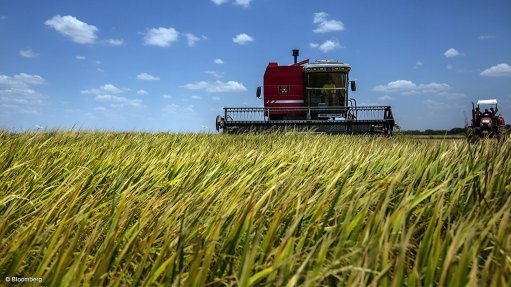
Photo by: Bloomberg
Two South African innovators in the agriculture industry, Reel Gardening and Meat Naturally, will on Wednesday battle it out against 48 other agripreneurs for the title of Agripreneur of the Year.
As part of agriculture innovation hub Future Agro Challenge’s (FAC’s) Global Championships, held in collaboration with the Securing Water for Food Grand Challenge, in Sandton, Johannesburg, this week, the award will enable the winning idea to be funded and developed on a large scale.
In sub-Saharan Africa, one in four people do not consume their minimum dietary energy needs. In South Asia, this climbs to one in six. Over 165-million children under five suffer from growth stunting owing to chronic malnutrition.
With around 759-million people in the world going hungry every day and the looming global water crisis placing pressure on agricultural sectors, the need for innovative technology development in the food, agritech and agriculture sectors is increasing.
For this reason, the FAC is seeking ideas to discover innovative and fundable ventures. “With the challenge of increasing food production to feed a growing world population, the need [for innovation] must be in the frontlines to feed tomorrow’s world, with today’s systems,” FAC co-founder and co-founder of nongovernmental organisation Industry Disruptors Carla Tanas said on Monday.
Reel Gardening, which encompasses a biodegradable seed tape, was designed to be the simple solution to gardening. The seed system can be grown into a vegetable or herb garden in nearly any climate, using 80% less water and providing a source of food.
The Meat Naturally initiative implements communal grazing systems that result in improved water and food availability. The business model is based on training herders and supporting market access, as well as ensuring sustainability in formal private sector markets.
Other sub-Saharan African initiatives include a mobile weather forecasting system, which sends an SMS to help small-scale farmers in West Africa predict water availability and improve their yields, while in Mozambique, innovations such as flying sensors that provide high-resolution spatial information and the use of bat guano as a natural fertiliser have come to light.
In Zimbabwe, a public-private partnership on agro-ecology principles, aimed at improving the family farming value chain has also been recognised at the awards. The Smart Villages Smallholder enterprise uses a mobile phone app to better coordinate the actors and guarantee the sustainable transfer of knowledge.
Tanas called on investors in agricultural technologies, business and nonprofit technologies for smallholder farmers to further consider the innovations highlighted during the summit for further development.